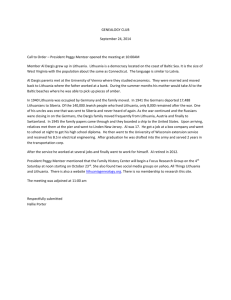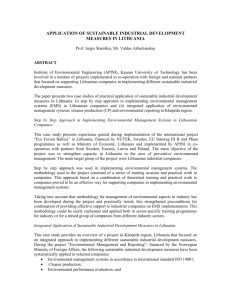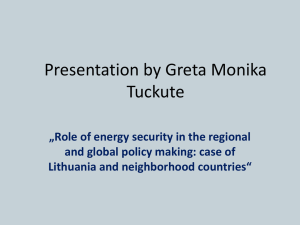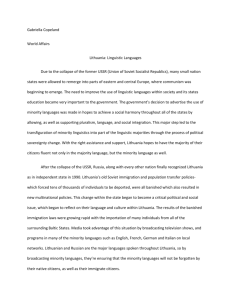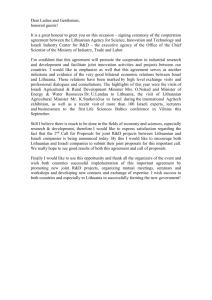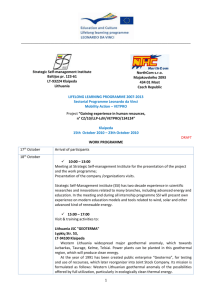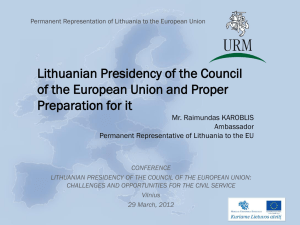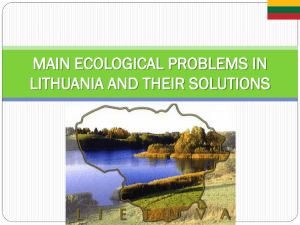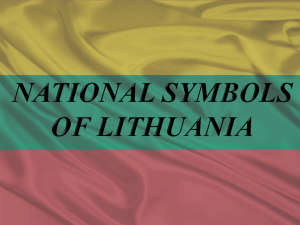Crisis trust and migration from Lithuiania NSA paper 8 August 2012
advertisement
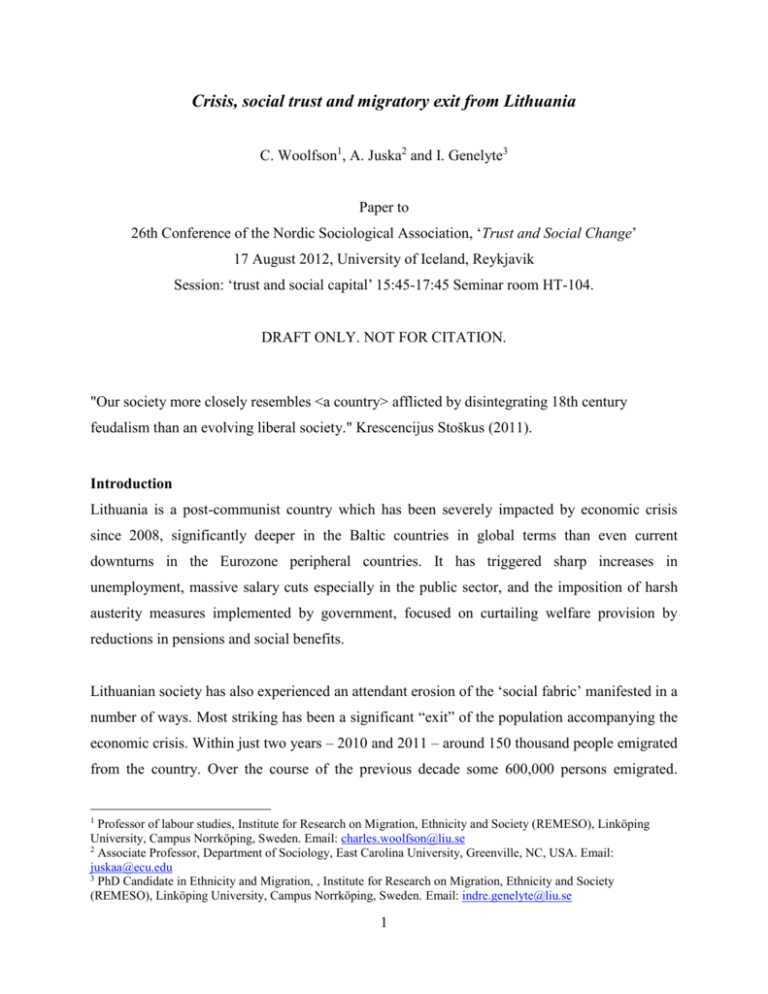
Crisis, social trust and migratory exit from Lithuania C. Woolfson1, A. Juska2 and I. Genelyte3 Paper to 26th Conference of the Nordic Sociological Association, ‘Trust and Social Change’ 17 August 2012, University of Iceland, Reykjavik Session: ‘trust and social capital’ 15:45-17:45 Seminar room HT-104. DRAFT ONLY. NOT FOR CITATION. "Our society more closely resembles <a country> afflicted by disintegrating 18th century feudalism than an evolving liberal society." Krescencijus Stoškus (2011). Introduction Lithuania is a post-communist country which has been severely impacted by economic crisis since 2008, significantly deeper in the Baltic countries in global terms than even current downturns in the Eurozone peripheral countries. It has triggered sharp increases in unemployment, massive salary cuts especially in the public sector, and the imposition of harsh austerity measures implemented by government, focused on curtailing welfare provision by reductions in pensions and social benefits. Lithuanian society has also experienced an attendant erosion of the ‘social fabric’ manifested in a number of ways. Most striking has been a significant “exit” of the population accompanying the economic crisis. Within just two years – 2010 and 2011 – around 150 thousand people emigrated from the country. Over the course of the previous decade some 600,000 persons emigrated. 1 Professor of labour studies, Institute for Research on Migration, Ethnicity and Society (REMESO), Linköping University, Campus Norrköping, Sweden. Email: charles.woolfson@liu.se 2 Associate Professor, Department of Sociology, East Carolina University, Greenville, NC, USA. Email: juskaa@ecu.edu 3 PhD Candidate in Ethnicity and Migration, , Institute for Research on Migration, Ethnicity and Society (REMESO), Linköping University, Campus Norrköping, Sweden. Email: indre.genelyte@liu.se 1 Today the population is just over three million. However, this paper suggests that while economic motives may have previously been the primary driver of emigration, the impact of current crisis has led to a new kind of migration driven by a deeper social disenchantment with the current socio-political arrangements of post-communist society, raising questions concerning its longer-term social and economic sustainability. It is a shift increasingly recognized in emergent public discourse and to some extent reflected in statistical data including the European Social Survey (ESS 4.0), Eurostat data and recent surveys on national level. The paper accordingly argues that Lithuania today is experiencing crisis-induced erosion in the relationships between individuals, society and the state, amounting to a social and political “disenfranchisement.” How has this state of affairs come about? Can it really be said that recent flows of migration represent a migration that is qualitatively new? The contention of this paper is that the mass “exodus” of the population is not a simple reflection of either rising unemployment, far less of administrative changes in the registration system for those leaving the country. It goes beyond a simple response to economic adversity and signifies a deeper crisis-induced rejection by a significant proportion of the population of the very society into which they have been socialized. In order to grasp the full impacts of this crisis, the changing relationships between individual, society and the state are examined. It is argued that policies of austerity adopted by the Lithuanian government in response to global economic and financial crisis and the bursting of the housing bubble in 2008, have re-confirmed underlying significant changes in prevailing interpretations of the social compact between the state and society, between individuals and the wider polity. Some theoretical considerations Arguably those scholars who have examined social trust and distrust those who have done so in the context of post-communist society have had a particularly keen theoretical edge (Kornai, Rothstein, Rose-Ackerman, 2004; Markova, 2004). A common theme is the identification of the erosion of both “interpersonal” and “generalized trust” in formerly socialist societies and the attendant difficulty of generating trust in the new social and political arrangements put in place following the collapse of communism. The absence of, or at least continuing low level of trust in 2 the new democratic set-up is viewed as an unanticipated and unwelcome accompaniment of rapid and tumultuous transition to the free market (Stompka, 1993; 1996; 1999: 174-79). Nevertheless, the concept of trust has on the whole been framed within an optimistic purview in which distrust will be overcome as the institutions and practices of liberal democracy become embedded in society. Yet neither the history of transition nor the ambiguous legacy of the previous era suggests that such an outcome is either likely or even possible. The process of transition created at the same time the deep “social shock” of mass unemployment, inflation, new poverty, corruption, the absence of due process and accountability, flawed privatization, growing organized crime and personal insecurity on a scale that was simply not conceivable for most of the citizens of these once stable, if somewhat authoritarian socialist social systems (Berend, 2007). That said, in the socialist era, trust in others was often personalized, confined largely to the intimate circle of the family and work colleagues and often matched by a pervasive distrust of the agencies and institutions of the ruling party and its regime. Nevertheless, “actually-existing socialism” offered educational opportunities to the young, a guaranteed job if not always matching individual desires, a place to live and at the end of working life, a state retirement pension if only modest. In establishing the new social and political order in which these “gains” were quickly sacrificed on the altar of market principles and individual responsibility, and in the “grand sorting out” into “winners and losers” which subsequently took place, arguably social trust, in both a generalized and personalized sense was dissolved in the implosion of an individualism, crafted not so much by an ideological embracing of the new order, but by the needs of survival in desperately uncertain times. The hardships and disappointments of the transition period stood in sharp contrast to exaggerated expectations of a brave new future the populace had been led to believe would accompany the new social system. The initial rationale during the transition years may be summed up as that of a “necessary temporary sacrifice” to clear out the negative inheritance of the previous system, in order to make way for a more democratic future. In reality, this official narrative very quickly gave way to an increasing social pessimism and pervasive social alienation. Within a few years of the shift to the free market, public opinion polls across Eastern Europe recorded widespread and growing disenchantment with the unrealized material benefits of the new democracies and disengagement from the new democratic institutions. 3 It is the key contention of this paper, the dialectic of trust/distrust in post-communist society has undergone a further qualitative transformation in the current global economic and financial crisis. The crisis has produced a new “social shock” on a scale which in many respects outmatches that of the early years of transition. For post-soviet states such as Lithuania, forged around a unified ideology of ethno-nationalism, it has marked a turning point, the “end of the post-communist dream” and a final punctuation point on whatever illusions of a progressive or socially just future might have existed under the new order of capitalism. The global financial and economic crisis, as experienced in Eastern European countries such as Lithuania represents not so much a crisis of capitalism, but a crisis of post-communism. Theoretically, we acknowledge seminal insights of Hirschman’s classic exit/voice/loyalty equation, especially as applied among others by W. Rogers Brubaker (1990) and latterly by Hirschman himself (1993) to the study of out-migration in post-communist societies. We examine the impact of crisis in terms of a qualitative shift in the relations between individuals and society and individuals ant the state. We suggest that the conventional notions of “distrust” are not adequate to grasp the tipping point which this represents in the development of postcommunist society. Instead, the notion of “social disenfranchisement”’ is proposed, as an active ‘dis-location’ of the individual from the social fabric of society, manifest in the final dissipation of both political and industrial citizenship. To explore this contention further we focus on one paradigmatic neo-liberal post-communist society, the former Baltic Soviet republic of Lithuania and the contemporary massive out-migration of its population. Economic crisis, inequalities and unrest The economic crisis from 2008 onwards produced a transformative social shock, even more so, as it contrasted with several boom years between 2004 and 2007 in which economic growth at around 7% of GDP per annum was among the highest in the European Union. During the socalled “fat years” the Lithuanian population had come to believe in the miracle of a “tiger economy” with vistas of unending prosperity in an “open” neo-liberal economy (Bohle and Greskovits 2007). At one stage in 2007, property prices per square metre in the capital city of Vilnius exceeded those in Stockholm. The rapid growth that produced this prosperity bubble brought with it significant social inequalities and social costs. Social inequalities in terms of 4 income were increasingly pronounced in this embedded neo-liberal market economy which offered its citizens only the most rudimentary levels of social protection (Figures 1 and 2). Figure 1. Gini coefficient (2009) Finland Sweden United Kingdom United Kingdom Slovakia Spain Sweden Slovenia Romania Portugal Poland Austria Netherlands Malta Hungary Luxembourg Latvia Cyprus Italy France Spain Greece Ireland Estonia Germany Denmark Czech Republic Bulgaria Belgium Lithuania 35.5 40 35 30 25 20 15 10 5 0 Source: Eurostat Figure 2. Level of total expenditure on social protection as a % of GDP (2008) 35 30 25 20 15.70 15 10 5 Slovenia Slovakia Romania Portugal Poland Netherlands Malta Luxembourg Lithuania Latvia Italy Ireland Hungary Greece Germany France Finland Estonia Denmark Czech Republic Cyprus Bulgaria Belgium Austria 0 Source: Eurostat Lithuania, on the eve of crisis therefore was already a society of deep underlying social inequalities and tensions. As the global economic crisis engulfed Lithuania, and the housing bubble burst, the economy entered a free-fall that made the impact of recession in the Baltic 5 region among the most severe of the EU countries (and arguably in the world). Between the second quarter of 2008 and 2009, real wages in Lithuania declined more steeply than any other EU country (Figure 3). Figure 3. Year on year percentage real change in wages and salaries (2Q 2008- 2Q 2009) Unemployment, although falling overall slightly in most recent periods, rose during the crisis to among the highest levels in the EU27 compared to the EU average of 9.7% in September 2011, exceeded only by Greece (17.6%) and Spain (22.6%) (seasonally adjusted figures). However, long-term unemployment continued to grow (Figure 4). Figure 4. Unemployment rate (percentage of active population) 20% 18% Of active population 16% 17.8% 17.4% 15.4% 13.8% 14% 10% 13.7% 11.4% 12% Unemployment 8.3% 9.3% 7.4% 8% 4.3% 6% 4% 2% 8% 5.8% Long-term unemployment 5.58% 3.2% 4.3% 1.2% 0% 2001 2002 2003 2004 2005 2006 2007 2008 2009 2010 2011 Source: Statistics Lithuania, Eurostat 2011 6 In response to the economic crisis, Baltic governments introduced radical austerity measures, a so-called “internal devaluation” which included steep wage and social benefit reductions, cuts in public expenditure and an extensive re-writing of protective labour legislation. Such radical austerity measures were imposed mainly without popular or democratic consultation with representative bodies such as trade unions, small business representatives or organizations speaking for selected vulnerable groups such as students and pensioners. The result was unprecedented mass protests on the streets both in Latvia and in Lithuania which in January 2009 ended in rioting in the capital city and ongoing protests up and down the country (Mullett 2009, Thomas 2010). The failure of “voice” As with many other post-communist societies, Lithuania has seen strikes, protest demonstrations, blockades, prolonged public fastings. However, social disorder on this scale had never before been seen in the post-socialist period and in a fundamental respect was a turning point in the development of the country since its independence from the Soviet Union. Social unrest was a deep jolt to the complacency of the ruling authorities who had relied on the famed “passiveness” of the Lithuanian population. For the government of the day, only organized conspiracy on the part of “Lithuania’s enemies” could explain the scale and intensity of the disorder which saw hundreds arrested and tear-gas and rubber bullets used against demonstrators outside the “Seimas” (parliament). Yet beyond conspiracy theories which largely failed to gather popular traction, there emerged a new set of discourses, entirely incompatible with the previous assumptions of a unified nation liberated from the yoke of Soviet oppression. The material nature of this discourse, i.e., relations among language, ideology and class position highlights understanding of discourse and language as the key to an interpretation and understanding of social struggle (Hall 1997; Voloshinov 1973). For the first time, official narratives of a free, socially just and democratic Lithuanian citizenship were thrown into question by a marked shift towards authoritarian state responses and the suppression of further public manifestations of dissent (Juska and Woolfson 2012a). The anti-austerity protests in 2009 were marked by unprecedented popular demands for “social justice.” These demands were for social justice for the “tauta” (the ordinary “people”) and/or for 7 respect for the dignity of individuals who felt they were literally “swindled” in broad daylight by the government that they had elected and abused by the “valdininkiai” (the state bureaucrats) who presided over the state system. Yet in the media, those who protested the current state of Lithuania were described more in terms of participating in a spontaneous burst of popular fury, but not as representatives of organized or communal interests (such as labour unions) with legitimate demands and grievances to be addressed by the authorities. Rather they were depicted as representatives of disparate social-demographic categories such as pensioners (especially elderly ladies throwing stones at the “Seimas” could be considered as the epitome of the wrath of the “tauta”, the nation in its righteousness), or at best as fragmented sectional groups such as small business owners, students, workers, and unemployed without common demands. The recognition that there was legitimacy to the protesters’ grievances was at best oblique. What was clearly a new turn of events and a new kind of popular unrest in Lithuania found only a partial discourse to describe its full resonance with long-standing but unrealised claims for social justice (Balockaite 2009). Yet beneath official narratives, a second or ‘hidden transcript’ unacknowledged in the official discourse has emerged which has powerfully critiqued the prevailing systemic social inequalities of Lithuanian society (Matonyte 2006). Social injustice in Lithuania is seen as a twofold phenomenon. On the one hand, there is the perception of “nepotism” or the “protection of favoured individuals”. This phenomenon is rooted not only in the private, but in the public sector as well. Nepotism prevents individuals from having a perspective of career advancement based on merit or personal worth, if they do not have informal network of “important persons”. This especially it harms the careers of young welleducated and high skilled individuals (Udrenas 2011). On the other hand, social injustice is perceived due to the different rights and double standards applied with respect to different social groups. The elite in Lithuania is seen as the privileged group, in particular, businessmen and politicians and other high officials. The sharpest criticisms are devoted to the latter. According to one author, “it is hard to expect that businessmen will share their profits”, but representatives of the government should be more concerned about the nation than about the private interests” (Stoskus 2011). The new and explicit discourse of “them” and “us” is indicative of a growing erosion of trust between classes supposedly formerly “united’ in society and speaks to a wider rupture of previous assumptions and attitudes. 8 Utilising survey data from the Fourth European Social Values Survey carried out in the first part of 2009, just as the crisis was beginning to peak, allows these developments to be placed in a wider although incomplete context in terms of capturing the dynamic evolution of the problematic of “social disenfranchisement.” They address only the more traditional measures of trust and distrust. For heuristic purposes, we compare Lithuania (as a “low-trust” postcommunist society) with Sweden (a representing a “high-trust” Nordic/Scandinavian social democracy) recognising that the latter represents an ideal type. Figure 5 offers an insight into the differing character of interpersonal relations along a number of measures of social distance. Three indicators are composited along an eleven-point scale: ‘Most people can be trusted or you can't be too careful’; ‘Most people try to take advantage of you, or try to be fair’; ‘Most of the time people helpful or mostly looking out for themselves’. The shaded area to the left of the median line (the mid-point between ‘extreme distrust’ and ‘extreme trust’ of other people) indicates the much greater social distance in Lithuania as compared to Sweden, and the correlative much higher level of expressed social trust in other people in Sweden as compared to Lithuania. Figure 5. Social distance indicators (Lithuania and Sweden compared) Source: European Social Survey (ESS4), 2009. 9 Even greater disparities between Lithuania and Sweden when it comes to trust in political institutions of society. Four key scalar indicators are presented: ‘Trust in the country’s parliament’; ‘Trust in the country’s legal system’; ‘Trust in politicians’; ‘Trust in political parties’. Although there is some mistrust in Sweden with respect to political institutions (revealed by the non-shaded area to the left of the median line), overall the two countries present a polar opposite low trust/high trust ‘mirror image’ displayed by the shaded areas each side of the median (Figure 6). Figure 6. Trust in political institutions (Lithuania and Sweden compared) Source: European Social Survey (ESS4), 2009. A contrastive mirror-image picture is revealed when it comes to satisfaction with the democratic system when comparing Lithuania and Sweden, although in terms of dissatisfaction for Sweden the scores are quite minimal. As above, the shaded areas to the left and right of the median line suggest a stark attitudinal contrast between these two countries. 10 Figure 7. How satisfied with the way democracy works in country (Lithuania and Sweden compared) Source: European Social Survey (ESS4), 2009 Low levels of trust in politicians, political institutions of democracy and the state are mirrored in overwhelmingly negative evaluations of current Lithuanian society in general. A representative survey conducted in December 2010 through to January 2011 found that 80% of respondents were of the opinion that they are living in “a patently socially unjust society” where the affluent elite dominated the rest of the population possessing significantly lower standards of living, while an insignificant middle class was sandwiched in between. According to this survey, perceptions of inequalities and powerlessness seemed to be pervasive among the workforce as well. Forty-one percent of respondents considered that employers wielded unchecked and excessive power over their employees, compounding general perceptions of social and economic insecurity. The survey also revealed in line with previous data on social trust in general that only 14% of 15-24 years age group said that “one can trust other people”; among 60 years and older the proportion of those trusting others was the highest – 20%; 38% of all respondents said that they were afraid about “being abused by others” were they to find themselves in a vulnerable situation (Jursyte 2011). 11 Popular contributions to online media discussion websites also suggest just how sharp the new critique of perceived social injustice has become. A review of analytic contributions from a variety of commentators reveals the prevalence of new discourses on ‘social serfdom’, ‘social disenfranchisement’ representing a moral and ethical critique of the bureaucratic ruling classes or “valdininkija” who along with their business allies, act as faceless and uncaring with regard to the ordinary people of Lithuania (Juska and Woolfson 2012b). The framing of such narratives in terms of seemingly archaic terms such as “social serfdom” and “social disenfranchisement” indicates an deep subversion of the social contract between the state and the people, expressed as the humiliating dependency and the helplessness of citizens when dealing with state officials seen as masters of obstructionism in the issuing official papers; condescending in their attitude towards ordinary people. In turn, this has strengthened a widespread perception that most important matters can only be resolved through friends and acquaintances rather than through official channels; propagating a general sense of pervasive social uncertainty and vulnerability, and a deep mistrust of employers, courts, and state institutions and indeed of authority in general (Markeviciene 2010). There is “hostility” between the nation and the authorities (Ozelyte 2011), the officials who have “occupied” (Sepetys 2011) the state and for whom the nation is needed as a passive instrument only during the elections, but as a nation it does not and indeed is not permitted, to participate in active governing (Sakalas 2011). Voter turnout in elections also provides a measure just how deeply embedded political alienation has become. Very low levels of trust in the “Seimas” and the government are reflected in growing levels of voter apathy especially when compared with high levels of voter participation in national elections during the 1990s. Thus, in 1993 and 1997 presidential elections threequarters of eligible voters cast their votes. By the early 2000s, voter participation had decreased significantly to about 52% in 2004 and 2009 (see The Central Electoral Commission of the Republic of Lithuania at http://www.vrk.lt/en/ ). Over the last decade (2001-2011; N=1,000) annual representative surveys have also been conducted within Lithuania on perceptions of the general public concerning the quality of services provided by and trust in state institutions (Gaidys 2011). The legislative and executive branches of the government were especially 12 negatively evaluated.4 More specifically, the proportion of those who trust the “Seimas” decreased from 14% in 2001 to 6% in 2011, while those who distrust the parliament increased from 54% in 2001 to 79% in 2011. Corresponding numbers of those trusting government declined from 23% in 2001 to 15% in 2011, and increased from 38% to 58% for those declaring distrust. Equally, in a 2009 survey about a third of respondents failed to identify even one state institution (national or local) in which they had trust (Baltijos Tyrimai 2010, 7; Vilmorus 2009, 13; 20). By 2011, only 15% of respondents held the opinion that their voice counted in Lithuania, the lowest among EU countries (Gaidys 2011). In another survey in 2011, 82% of respondents claimed that politicians were in politics for personal gain only and only 6% were of the opinion that while in office politicians act in a just manner (Samoskaite 2011b). As the crisis of 2008 and 2009 developed, Eurobarometer data confirmed a sharp downturn in general optimism concerning the direction of development of the country. Figure 8. At the present time, would you say that things are going in the right direction or in the wrong direction in your country? (percentage of positive answers) 60% 53% 50% 42% 40% Estonia Latvia 30% Lithuania 20% 10% 10% Sweden 7% 0% 2006 2007 2008 2009 Source: Vihalemm (2011) 4 The exception in this respect were increasing positive evaluations and the trust of the presidency over the last few years, reflective of the hopes associated with the election of a popular new president of the country in 2009. Thus the proportion of those trusting presidency increased from 53% in 2006 to 67% in 2010, while those whom distrusted the presidency declined from 35% to 21% correspondingly (Baltijos Tyrimai 2010, 7; Vilmorus 2009, 18). However, the presidency in Lithuania, which is parliamentary republic, is primarily a ceremonial office with authority extending mostly to foreign affairs. 13 These indicators of heightened level of general pessimism in Lithuanian society and expectations for the future, are of course no more than what might be expected given the gravity of the economic crisis. However, taken together with the array of survey evidence presented here of eroded support for political institutions and processes, of an absence of trust in the institutional of society and the polity, and of widespread perceptions of a lack of social justice, our key contention is that the impact of the economic crisis, in the absence of a cushion of social solidarities to absorb the shock of severe downturn, has delivered something of a “finishing blow” to the socio-political and ideological project of post-communism. The outcome of lack of “voice” is “exit” on a massive scale. What is new however, is the previously neglected driver which Hirschman (1970) identified in his classic work, “loyalty” or more precisely, the disintegration of residual loyalties in the context of impaired citizenship in neo-liberal postcommunist society. Migration from Lithuania We can distinguish several ‘waves’ of outmigration from Lithuania. The first wave was of the migrants who left Lithuania in the years following political independence from the USSR. Substantial numbers of these were Russian-speaking citizens who migrated Eastwards in the early 1990s. This then was largely a ‘repatriation’ migration occasioned by ‘voluntary’ outmigration of those who did not represent, or had no stake in the new titular ethnic elites which substituted formerly dominant Russian-speaking nomenklatura. The second wave comprised those who sought economic and material improvement abroad, mainly in the West, in the years up to the 2004 integration of Lithuania in the European Union. Much of this migration was ‘illegal’ or undocumented. With EU membership, came free movement of labour, at first limited to Ireland, UK and Sweden. It was one of the important new rights that EU membership bestowed on the Lithuanian population, the freedom to travel and seek work wherever. Many of these were ‘temporary’ migrants who anticipated a return home after a period of high earning abroad. Of course, there is nothing more permanent than temporary and many did not return. However, this was a classical economic migration within the framework of new mobility opportunities brought about by EU enlargement. 14 The third wave, which is the subject of this paper, has been occasioned by the contemporary global economic and financial crisis since 2008. As economic crisis intensified unemployment grew from a relative low level of 4.1% in 2007 to 18.3% in the second quarter of 2010 with a concomitant increase in emigration from 26.6 thousand in 2007 to 83.2 thousand in 2010 (Statistikos Departamentas 2011). This was the highest level of emigration since 1945 and comparable only with scope of depopulation of the country during World War II. Since the restoration of independence in 1990, out of a population of some 3.7 million, 497 thousand had left the country; three fourths were younger persons (up to 35 years old), many of them educated and with jobs in Lithuania. By 2008 the emigration rate from Lithuania was the highest among the EU countries (2.3 per 1,000), and double that of next highest county - Latvia (1.1 per 1,000) (Statistikos Departamentas 2009: 7). However staggering these numbers for such a small country, there were substantial grounds for speculation that actual number of people who have left the country was even higher as official statistics substantially undercounted migration flows. A better accounting of migration by state agencies (following introduction of mandatory health insurance fees for those not declaring departure), gave an increase of six times over the previous year of those officially registered as leaving. Since 2010 was the second year of economic crisis, the scale of previous underestimates can perhaps be better calibrated to around 150,000 persons who had departed officially and perhaps many more unofficially. To put these figures in a global context, currently about 1 in 7 Lithuanians are living abroad; in comparison only about 1 in 10 Mexicans are living in the US. Add to this out-migration an overall negative rate of population growth. Demographers previously proved to be too optimistic in their forecasts (the latest were issued in 2010) and had overestimated the size of Lithuanian population by about 200,000. Instead of forecasted 3.24 million, the census found that by 2011, Lithuania’s population was only just over 3 million (3.054 m) (Saukiene 2011a; Statistics Lithuania 2011). Taken together with general negative population growth and declining birth rates, forecasts for the period 2008-2035 suggest a further population decline of 10.9% for Lithuania, one of the highest rates in the EU (following Bulgaria and Latvia) (Eurostat 2008). 15 Figure 9. Declared and undeclared emigration Lithuania 2001-2011 Source: Statistics Lithuania The statistics of migration have of themselves become a point of contention in this debate. On the popular Lithuanian news website (Delfi.lt) some contributors have suggested that the scale of emigration may not be accurately revealed (as people seek to avoid social insurance obligations by declarations of “false” departure). Moreover, some have even claimed that the census itself was not transparent or accurate. Demography and ‘national identity’ have become intertwined in public consciousness in quite a new way. One political commentator has suggested that census was a waste of money (Valatka 2011). Another politician has tried to estimate the “real” extent of emigration, based on the local Swedish-owned SEB Bank’s information concerning remittances sent home by Lithuanian emigrants (Navickis 2011). According to this latter view, the results of the census were “strained” in order to have a number just reaching the 3 million 16 mark and that the decline of population due to emigration is even higher than previous estimates (Jancoriene 2011). The symbolic significance of the “three million” mark suggests that there are deeper currents in this new national debate on migration which touch fundamental dimensions of social and political vulnerability in a time of social and economic crisis. This intensified emigration is not simply a matter of quantity however. It also has a qualitative aspect. Data from the Lithuanian Statistics Department show that in last few years, particularly since the beginning of economic crisis, more women and youth have tended to emigrate. Educated people are leaving the country and entering a low-skilled labour market in Nordic countries. Furthermore, the number of children (under 18) emigrating is increasing. This is leading to another new trend – permanent “family-based” emigration. Thus it is no longer exclusively a matter of “transnational” individuals leaving for a time-framed opportunity to earn money and send back remittances to families remaining in Lithuania, but of whole families exiting to other countries together with their children. Figure10. Emigration by age group (2011) 25% 21.8% 21.0% 20% 15% 12.7% 10.5% 10% 8.6% 7.1% 6.5% 5% 0% 0-14 15-19 20-24 25-29 30-34 35-39 40-44 Source: Statistics Lithuania This “permanent” out-migration is also becoming more common among young people. According to one authoritative national survey, more than one fifth (23%) of young persons, 17 aged 15-22 years, “do not see a future for themselves or their children in Lithuania” (Lauristin, Vihalemm 2011). The proportion of total emigrants declaring departure in 2011 comprised by the age group of 20-29 years (21%) represented almost three times their proportion of the total population (7%) (Statistics Lithuania). A migration on this scale throws into contention the future sustainability of any possible economic recovery in the short term, but more importantly of national viability in terms of human resources in the longer term. Conclusion For the first time in the post-communist era, a widespread public debate on the identity of Lithuania as a viable socio-political entity has ensued. Migration as an issue has polarised societal attitudes between those who are seen to have “betrayed Lithuania” by emigrating, and those who have remained as the “true Lithuanians” ready to “tough it out.” The spectre of rapid depopulation exacerbated by deep economic recession has conjured metaphors of hopelessness and despair among commentators. For some, the emigration from Lithuania is characterized as turning into evacuation of Lithuania; parallels have been made between the historically high rates of suicide in Lithuania (among the highest in the world) and massive emigration from the country, both being interpreted as forms of ‘self-destruction’ of the nation (Kukulas 2010); still others have lamented that even during the darkest years of Stalin’s terror and deportations, the population had not declined as steeply as it has done in the years from 2008 to 2010. This preliminary analysis of contemporary Lithuanian emigration suggests that previously exclusively economic motivations are now increasingly supplanted by new migration drivers rooted in “social disenfranchisement” that goes beyond commonly understood notions of social trust and distrust. Only by exploring these new socio-psychological drivers to migration in terms of a changed social consciousness and the tensions within this complex and emerging configuration of social understandings, can the scale and intensity, as well as the altered character of the outward migratory movement be explained. A transformational moment has occurred in post-communist Lithuania in which a new discourse has emerged infusing a qualitatively new dimension to emigration from Lithuania. We have attempted to theorize “social disenfranchisement” in terms of discourses on powerlessness and alienation that characterize contemporary Lithuanian society. We suggested that this is a notion that is with increasing frequency used in various forms of media, especially in discussions and explanations of what 18 seems is ever-growing emigration from the country. The prevalence of this notion and its other derivatives such as “social serfdom,” especially increased following the onset of the deep fiscal and economic crisis of 2008. In its sociological interpretation our notion of “social disenfranchisement” is closely related to Marxian notion of alienation - estrangement from society, the state, and each other, feelings of powerlessness and domination in conditions of (formally) functioning democracy and presence of all (formal) legal rights (Mészáros 2005). From this perspective, social disenfranchisement is a discourse on subversion of substantial democracy by the formal one, leaving citizens powerless, alienated and without meaningful participation and voice in politics, economy and civil life when either unaccountable “valdininkija” (state functionaries and politicians) and/or “oligarchs” co-opt the state and its institutions (Seimas, courts, etc.) in the service of their private/personal interests. The alternative to legitimized “voice” and substantive as against formal democratic participation is the silent migratory exit of the disillusioned and disenfranchised. Contemporary Lithuanian migration speaks to fundamentals of systemic socio-political failure; the denial of democratic voice, the dissipation of social trust, the dissolving of solidarities, the atrophy of remaining reserves of social resilience and above all, the social and economic failure of a post-soviet experiment in extreme neo-liberal free market reconstruction. Lithuania is a society in disintegration in which economic crisis and austerity, and the responses of the state to this conjuncture, has unravelled vestigial social solidarities. A tipping point has been reached for a population now themselves increasingly dis-located within polity and society, distanced from the united and optimistic ethno-national project of yesteryear. In this respect the “new” migration from Baltic Lithuania represents not a migration driven by simple “economic determinism”, but a critique and rejection of the existing society, and perhaps an attempt to realize through “exit” unfulfilled egalitarian and democratic aspirations towards “voice” currently denied. As one emigrant remarked: “Our suitcases are our protest placards.” Acknowledgements This paper is based on ongoing research funded by the Swedish Council for Working Life and Research (FAS) Project Number: 2011-0338, Svensk modell och baltisk rörlighet: harmonisering eller social dumpning? En studie av arbetsmigration mellan Baltikum och Sverige. The Swedish Institute, Visby programme grant 00749/2010 ‘East-West labour migration, industrial relations 19 and labour standards in a Swedish-Baltic context’ and the Swedish Sociological Association also provided mobility support to Indre Genelyte. References Balockaite, Rasa (2009) ‘Can You Hear Us? The Lower Class in Lithuanian Media and Politics’, Problems of Post-Communism 56(1): 12-20. Baltijos Tyrimai (2010): Lietuvos gyventoju apklausa apie valstybės ir savivaldybės įstaigas, Vilnius. Berend, Ivan. T. (2007) Social Shock in Transforming Central and Eastern Europe, Communist and Post-Communist Studies 40: 269-80 Bohle, Dorothy and Greskovits, Bela (2007) Neoliberalism, embedded neoliberalism and neocorporatism: towards transnational capitalism in Central-Eastern Europe, West European Politics 30(3): 443-466. Brubaker, Rogers W. (1990) ‘Frontier Theses: Exit, Voice, and Loyalty in East Germany’, Migration World 18(3-4): 12-17. Eurostat (2008): Population projections 2008-2060, Brussels, August 26. http://europa.eu/rapid/pressReleasesAction.do?reference=STAT/08/119 Eurostat (2011) Euroindicators, September 2011 Euro area unemployment rate at 10.2%, EU27 at 9.7%. STAT/11/160, 31 October. http://europa.eu/rapid/pressReleasesAction.do?reference=STAT/11/160&type=HTML Gaidys, Vladas (2011): Lietuvos Gyventoju Nuotaikos Visuomenes Nuomones Tyrimu Duomenimis, Vilnius, Vilmorus. Hall, Stuart (1977) Culture, the media and the ‘ideological effect’. In: Curran J, Gurevitch M, Woollacott J (eds) Mass Communication and Society. London: Edward Arnold, 315–348. Hirschman, Albert, O. (1970) Exit, Voice and Loyalty. Responses to Decline in Firms, Organizations, and States. Cambridge, MA: Harvard University Press. Hirschman, Albert O. (1993) Exit, voice, and the fate of the German Democratic Republic, World Politics 45(2): 173-202. 20 Jančorienė, Meilė (2011): Iš emigracijos Anglijoje – atgal į Lietuvą, Gimtasis kraštas, Delfi.lt, 27 May. http://www.delfi.lt/news/daily/emigrants/is-emigracijos-anglijoje-atgal-i-lietuva.d?id=46004751 Juršytė, Justina (2011): 80 proc. lietuviu mano gyvenantys socialiai neteisingoje visuomeneje, Delfi.lt. Vilnius. June 3. http://www.delfi.lt/archive/print.php?id=46206173 Juska, Arunas and Woolfson, Charles (2012a) ‘Policing political protest in Lithuania’, Crime, Law and Social Change 57(4): 403-424. Juska, Arunas and Woolfson, Charles (2012b) ‘Exodus from Lithuania: State, social disenfranchisement and resistance in an era of austerity’, in Kay Goodall, William Munro and Margaret Malloch (eds) Building Justice in Post-Transition Europe: Processes of Criminalisation within Central and East European Societies. London and New York: Routledge. pp. 56-77. Kornai, János, Rothstein, Bo and Susan Rose-Ackerman. (2004) (eds) Creating Social Trust in Post-Socialist Transition. New York: Palgrave Macmillan. Lauristin, Marju and Vihalemm, Peter (2011) ‘Satisfaction with outcomes of Baltic transition in Spring 2011’. Estonian Human Development Report, Baltic Way(s) of Human Development: Twenty Years On. Eesti Koostoo Kogu, Tallinn. Matonytė, Irmina (2006) ‘Why the Notion of Social Justice is Quasi-Absent from the Public Discourse in Post-Communist Lithuania’ Journal of Baltic Studies 37(4): 388-411. Markevičienė, Eglė (2010): Gelbėjimo ratas migrantų rankose, Kelias, Vilnius, July 8. http://www.delfi.lt/archive/article.php?id=34259167 Markova Ivana (ed) (2004) Trust and Democratic Transition in Post-Communist Europe. Oxford: Oxford University Press. Mészáros, István (2005) Marx's Theory of Alienation. London: Merlin Press (original edit 1970). Migracija skaiciais (2011): Project on international migration. www.123.emn.lt . Mullett, Adam (2009): Vilnius protesters clash with police, The Baltic Times, Riga, January 21. Navickis, Šarūnas (2011): Pinigai, skolos, emigracija ir savižudybės, Delfi.lt, 30 March. http://www.delfi.lt/news/ringas/politics/snavickis-pinigai-skolos-emigracija-irsavizudybes.d?id=43794717 Oželytė, Nijolė (2011): Galima nusilenkti emigrantams, Delfi.lt, 7 May. 21 http://www.delfi.lt/news/daily/emigrants/nozelyte-galima-nusilenktiemigrantams.d?id=45190515 Sakalas, Aloyzas (2011): Nesolidari tauta – tai išsivaikštanti tauta, Delfi.lt, 1 June. http://www.delfi.lt/news/ringas/politics/asakalas-nesolidari-tauta-tai-issivaikstantitauta.d?id=46143799 Samoškaitė, Eglė (2011): Lietuviai nepasitiki ne tik politikais, bet ir vieni kitais, Delfi.lt, Vilnius, September 22. http://www.delfi.lt/archive/print.php?id=49903004 Statistics Lithuania (2011): Statistics on international migration. www.stat.gov.lt. Stompka, Piotr (1996) Trust and Emerging Democracy: Lessons from Poland, International Sociology 11(1) 37-62. Stompka, Piotr (1998) Trust, Distrust and Two Paradoxes of Democracy, European Journal of Social Theory 1(1): 19-32. Stompka, Piotr (1999) Trust: A Sociological Theory. Cambridge: Cambridge University Press. Stoškus, Krescencijus. (2011): Tautos miršta taip pat kaip ir žmonės, Delfi.lt, 30 May. http://www.delfi.lt/news/ringas/lit/filosofas-k-stoskus-tautos-mirsta-taip-pat-kaip-irzmones.d?id=46046715 Šepetys, Lionginas (2011): Istorija mus mokė prisitaikyti, Delfi.lt, 19 June. http://www.delfi.lt/news/ringas/lit/lsepetys-istorija-mus-moke-prisitaikyti.d?id=46747229 Thomas, Langdon Jr. (2010): From Lithuania, a view of austerity’s costs, The New York Times, New York, NY, April 1. Udrėnas, Nerijus (2011): Emigraciją skatina psichologinis klimatas ir nepotizmas, Delfi.lt, 17 May. http://www.delfi.lt/news/daily/lithuania/nudrenas-emigracija-skatina-psichologinisklimatas-ir-nepotizmas.d?id=45569031 Valatka, Rimvydas (2011): Dūmų surašymas: 30 milijonų – kaip į užpakalį, Lrytas.lt, 10 March. http://www.lrytas.lt/-12994268011297684996-d%C5%ABm%C5%B3sura%C5%A1ymas-30-milijon%C5%B3-kaip-%C4%AF-u%C5%BEpakal%C4%AF.htm Vihalemm, Peter (2011) Human Development Index: common and different characteristics of the countries in the Baltic Sea region. Estonian Human Development Report. Baltic Way(s) of Human Development: Twenty Years On. Tallinn: Eesti Koostoo Kogu. Vilmorus (2009): Valstybės ir Savivaldybės Institucijų Aptarnavimo Kokybės Vertinimas 2009, Vilnius, Visuomeninės Nuomonės ir Rinkos Tyrimų Centras ‘Vilmorus’. 22 Voloshinov, Valentin, N. (1973) Marxism and the Philosophy of Language. New York: Seminar Press. 23
